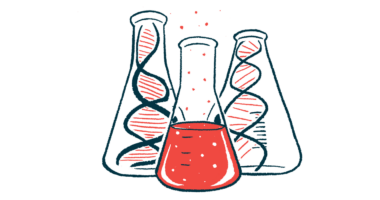CAR T-cell Therapy Safe, Effective in Treatment-resistant Myeloma: Study

A CAR T-cell therapy called CART-ddBCMA that targets the protein BCMA — produced at high levels in myeloma cells — safely led to lasting responses in relapsed and refractory multiple myeloma (RRMM) patients, a Phase 1 study showed.
Given the small study size, further trials in larger groups of patients are needed to confirm these findings. But, according to researchers, the trial — “designed to evaluate the initial safety of CART-ddBCMA administration” — was the first to “demonstrate the utility” of Arcellx‘s experimental therapy.
“CART-ddBCMA produce[d] deep and durable responses in patients with poor prognostic factors,” the team wrote.
The study, “Phase 1 Study of CART-ddBCMA for the treatment of subjects with relapsed and refractory multiple myeloma,” was published in the journal Blood Advances.
RRMM is a cancer of immune plasma cells characterized by a treatment-resistant disease that requires intensive therapy. Despite advances, there are limited treatment options for RRMM.
Myeloma therapies recently have been designed to target the B-cell maturation antigen (BCMA). This protein, produced on the surface of myeloma cells, plays a role in cancer cell survival and growth.
One approach to target BCMA and treat RRMM is CAR T-cell therapy. This involves collecting a patient’s T-cells — a type of immune cell able to fight cancers — adding a gene that encodes for a receptor that binds BCMA, called a chimeric antigen receptor, or CAR, then returning the modified cells to the patient, intending to stop myeloma cell growth.
Although effective, the available CAR-T cell therapies have limited responses, and there have been safety and production issues. Also, the body can elicit an immune response against the treatments, leading to rejection.
Arcellx’s CART-ddBCMA is a BCMA-targeting CAR T-cell therapy specifically designed to reduce immune responses against it, improve stability, and eliminate a broader range of cancer cells.
Scientists at Arcellx, collaborating with researchers based at the Massachusetts General Hospital, are evaluating the therapy in an open-label Phase 1 clinical trial (NCT04155749) in patients with RRMM. The study is currently enrolling patients ages 18 and older at sites in Massachusetts, Illinois, and Wisconsin.
Now, the team presented the results of 12 adults who received at least three prior regimens of myeloma therapy and were treated with either a low or high dose of CART-ddBCMA, administered directly into the bloodstream (intravenously).
The study’s primary goal was to evaluate the incidence of treatment-emergent adverse events (TEAEs), including side effects that limited dose. It also sought to establish a dose for further Phase 2 efficacy trials. Secondary measures included therapeutic responses, duration of response, progression-free survival (PFS), and overall survival.
All participants had more than 200 days (6.6 months) of follow-up at the time of data cut-off on Nov. 4, 2021.
Across both doses, the response rate was 100%, with nine individuals showing a complete response, one with a very good partial response, and two with a partial response. The response time ranged from 28 to 87 days — just less than one month to just less than three months — with improved responses over time. The overall response rates were similar across both doses. The median duration of response, PFS, and overall survival were not reached at both doses.
On day 28 (about one month) after infusion, the minimal residual disease, or the number of myeloma cells remaining in a patient, was evaluated in nine of the 12 participants. Among these, five had no signs of residual disease. By the last data cut-off, seven tested negative for residual disease. Disease progression was seen in three participants when assessed at longer time points.
The peak level of therapy within the body, the time to peak growth, and its persistence were similar for both doses. BCMA levels in the bloodstream, a marker for both plasma cells and myeloma cells, decreased in all participants following infusion, which continued to fall even after the CART-ddBCMA was undetectable.
Regarding safety, all participants experienced TEAEs following treatment, including low levels of immune neutrophils (92%), low red blood cells (83%), reduced white blood cells (67%), and decreased hemoglobin (75%), the protein that carries oxygen in red blood cells. By one month, most of these were resolved to pre-treatment levels of baseline or similar. Other TEAEs included high blood pressure (25%) and electrolyte imbalances (17%).
CAR-T cell-associated toxicities occurred in all patients, but most were low-grade and manageable. The releases of immune signaling proteins, or cytokines, were seen in all study participants. There was a median onset of 2.5 days and a duration of seven days at the low dose, and a median onset of one day and a 4.5-day duration at the high dose.
Four subjects in the low dose group and five in the high dose needed treatment with immunosuppressive therapies to manage cytokine release.
Notably, there were no cases of delayed onset movement disorders with features of Parkinson’s disease, “as described in other investigational and commercially available BCMA-targeted CAR T cell products,” the team noted. Lastly, the maximum tolerated dose of the therapy was not reached.
“[These] findings demonstrate the safety of CART-ddBCMA cells and document durable responses to CART-ddBCMA in RRMM patients,” the researchers concluded. “Further studies in larger [groups] are needed to confirm the safety and efficacy of CART-ddBCMA cells for treatment of [RRMM].
CART-ddBCMA has been granted fast track and orphan drug designation by the U.S. Food and Drug Administration (FDA) for the treatment of RRMM. The FDA also awarded the treatment regenerative medicine advanced therapy status.







